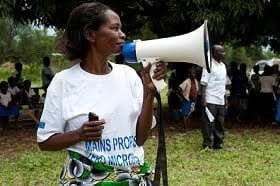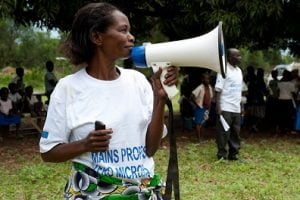Documenting learning from cash transfer programming in the Ebola context

Project background and CTP in Ebola Outbreak
The economic impact of the Ebola crisis is still to be fully understood, but in April 2015 the World Bank estimated 2.2 billion USD in economic losses due to the Ebola crisis in the three most affected countries (Sierra Leone, Liberia and Guinea), which caused huge economic impact at national, community and household levels. In this context, recovery is a major challenge for Ebola survivors and victims’ families.
Supported by its implementation partners, FFP (The Office of Food for Peace – USAID) was a major actor in the Food Security response to the Ebola outbreak in Sierra Leone and Liberia, with humanitarian contributions summing up to $101.5 million in 2015[1], embracing the idea of using CTP as a mechanism to support Ebola affected communities[2].
In order to document, analyze and draw learnings from those CTP projects during the epidemic, the the CALP Network and FFP are working together on a dedicated project in Sierra-Leone and Liberia, where FFP partners have implemented CTP through a diversity of technical approaches. This provides a unique opportunity for documenting and capitalizing on CTP in epidemic crises.
The role of the CALP Network in CTP Ebola epidemic response in Sierra Leone and Liberia
Building on its experience with the humanitarian community through capacity building, advocacy, evidence gathering and support to coordination, since 2014 the CALP Network has been responding to requests from actors involved in the Ebola crisis response in Sierra Leone and Liberia, supporting the creation of Cash Working Groups and sharing tools and/or resources.
The CALP Network has been charged with leading a learning path including a documentation report. This research piece consists of mapping, comparing and analyzing the diverse CTP strategies employed by FFP partners in Liberia and Sierra Leone in response to the Ebola outbreak from a technical perspective. This technical analysis is focused on key technical questions to provide learnings and recommendations for the broad community of practice, identifying factors of success and best practices to optimize the use of CTP in similar contexts / crises.

The CALP Network has therefore identified nine organizations, supported by Food for Peace to deliver CTP in Sierra Leone and Liberia, on which to base its documentation work.In the research process, the CALP Network will also conduct 4 learning events (2 in Sierra Leone and 2 in Liberia) providing space to share experiences collectively, discussing good practices and lessons learnt on CTP in the Ebola response.
A case study will be developed to illustrate notable approaches or dig deeper into specific operational lessons learnt. The CALP Network will also produce a video giving an overview of appropriateness of CTP in Ebola, illustrating the unique context of implementing CTP for such large scale and unexpected epidemics.
The CALP Network will ensure that all lessons learnt from the project benefit the global community of practice by organizing webinars and dissemination events to share the findings of the project products.
[1] USAID, June 2016
[2] 28,616 cases with 11,310 deaths, WHO June 2016


